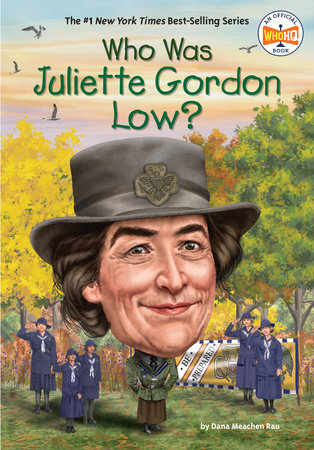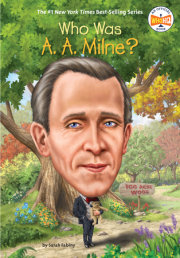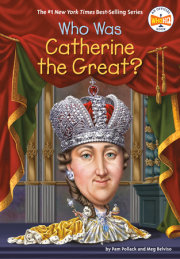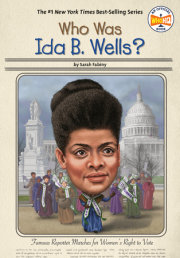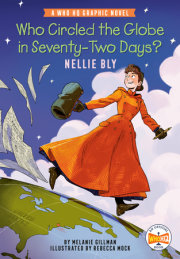Who Was Juliette Gordon Low? On March 12, 1912, in Savannah, Georgia, Juliette Gordon Low waited for her guests to arrive. Juliette liked to throw parties. And she was very good at it! She often invited other wealthy friends over to her home for lively conversation and fun. But this day was different. She was in her fifties, but she was hosting a gathering of young girls. This gathering was the first official meeting of the Girl Guides in the United States.
When the seventeen girls arrived, Juliette explained to her guests how much fun they would have in Girl Guides. They would explore the outdoors, play sports, and go on adventures. They would find ways to help their communities. They would wear uniforms and earn badges, just like boys did in Boy Scouts.
At this time in history, girls were taught many ways to act like “proper” ladies. In school and at home, they learned how to be good wives, mothers, and homemakers. Juliette herself was a proper lady from a wealthy family. Her whole life, she had tried hard to follow the rules. But she was always curious and willing to try new things, even when people told her she shouldn’t. Juliette wanted to change the definition of what it meant to be a lady. She felt ladies could also be strong, independent, and help change the world. Most of all, they could have fun doing it!
That’s what she wanted to teach these girls. Juliette’s joyful, friendly, and kind personality won over everyone at the meeting. Together, they recited the Girl Guide Promise, officially signed up, and toasted with hot chocolate. Eighteen girls became scouts that day—-but one of them wasn’t even there. Juliette had signed up her niece, Daisy “Doots” Gordon, at the top of the list. Juliette wanted Doots to go down in history as the first Girl Guide in America.
The organization she started in America soon changed its name to Girl Scouts. From that first meeting, over the past century, Girl Scouts has grown, with millions of members across the world.
Juliette Gordon Low blossomed into a brave and caring leader and devoted her life to helping other girls blossom into strong women, too.
Chapter 1: Daisy Grows Juliette Gordon was born on October 31, 1860. Her parents, William and Nellie Gordon, were pleased at this new little arrival. Her older sister, Eleanor, was excited for a new playmate. Juliette was named after her mother’s mother. To avoid confusion between the two Juliettes in the family, they called the new baby Daisy, which was a common nickname at the time. This nickname stayed with her for the rest of her life.
The family lived in a mansion owned by Mr. Gordon’s mother in the beautiful city of Savannah, Georgia. Her parents were wealthy. William was a businessman who bought and sold cotton in the southern United States. Nellie was a strong and friendly woman who liked to do as she pleased. She came from an important family in the northern United States. Her family was one of the first to settle in the city of Chicago, Illinois.
When Juliette was less than a year old, the American Civil War broke out between the Northern and Southern states. Her father left to become a Confederate (Southern) soldier. Her mother’s brothers were fighting for the North. Juliette often saw her mother looking sad, and she would only see her father when he came home for short visits.
Juliette spent her early childhood with her big sister, Eleanor. They played together on the violet--lined paths and climbed trees in the garden. Sometimes Juliette and Eleanor had to dress up and go for walks around the neighborhood, but Juliette would much rather be free to play!
Juliette’s little sister, Alice, was born in 1863. Then the Gordon household grew even fuller when Juliette’s aunts moved in. Because the country was at war, the family had a hard time feeding everyone. Mrs. Gordon’s family sent packages of food from Chicago, but that was still not enough. The young girls grew thin and sick. They had to take spoonfuls of sulfur medicine mixed with molasses, but they didn’t mind, since it tasted sweet.
In December 1864, the Union army arrived in Savannah, led by General William Tecumseh Sherman. Juliette peeked out the curtains to watch as the troops marched down her street. The Gordons worried that the soldiers would invade their house. Then one day, General Sherman himself came to the door!
Luckily, the Gordons weren’t in danger. General Sherman was friends with Juliette’s mother’s family in Chicago and had come to deliver letters. Union generals often came to visit the Gordons—-and one even gave Juliette her first taste of candy! General Sherman urged Mrs. Gordon to bring her daughters north to keep them safe. While Juliette’s father was still fighting as a Confederate soldier, Juliette’s mother bravely packed up her children and made the long journey to Chicago by boat and train. When they arrived in Illinois, the young girls, especially Juliette, were sick and close to starving. The doctor delivered the news that Juliette might die. But by the spring, she was healthy again.
The Civil War ended in April 1865. The North had won, and the South rejoined the United States. The Gordons traveled back to Savannah in August. Juliette was so excited to be home, racing her sister Eleanor up and down the porch steps. But Juliette was confused. She believed her father had been a brave Confederate soldier, but she had also met many nice Northerners. When someone told her the Confederacy was gone, five--year--old Juliette asked, “Where did it go?”
Juliette’s father began to buy and sell cotton again. Like many other wealthy Southerners, the Gordons had enslaved people working on their land. When slavery had ended, the Gordons hired workers to take care of their home and paid them. Juliette’s parents had more children—-William, Mabel, and Arthur. The Gordons moved out of the grandmother’s mansion and into their own house just down the street. Her cousins lived right next door. Now there were lots of children to play with! The children visited their grandmother’s house for tea every afternoon. She taught them manners and how to act like proper wealthy boys and girls.
But Juliette didn’t always act like a proper little girl! Although she was small and thin for her age, Juliette was filled with energy, bravery, and a fearless attitude, just like her parents. That often got her into trouble. Once, she knocked over a lamp, and her bed caught on fire. Another time, she let her cousin braid a length of taffy into her hair, and they had to cut it off. She would bring home stray puppies and kittens. She had a dog named Bow--wow and a cat named Kittle. One night, she worried that her cow might be cold outside. So she sneaked out to the barn and wrapped her in some of the family’s best blankets. The next morning, the fine linens were trampled, muddy, and ruined. When she had an idea, it was hard to get her to change her mind. Her family called her Crazy Daisy, because they never knew what sort of outrageous stunt she would be up to next!
Chapter 2: A Proper Lady Juliette spent her childhood summers with her sisters, brothers, and cousins in northern Georgia. Her aunt and uncle had a large old house on the Etowah River. Some summers, there could be up to twenty children staying at the house. This is where Juliette’s curiosity and creativity bloomed.
The children played on the cliffs, climbed the trees, and swam in the river. They used the schoolhouse among the walnut trees to play “hotel.” They created their own paper money, and then bought “rooms” in the hotel, peaches from the nearby orchard, or rides in carts pulled by the donkey or goats.
Juliette wrote scripts, designed costumes, and starred in little plays. She charged the adults for tickets and sent the money to help the Native Americans she’d met when she lived in Chicago. She wrote articles and poems for her older cousin’s newspaper. She painted paper dolls for her younger cousins.
But when she went back to Savannah, Juliette had to go to school. Until she was twelve years old, she attended school at Miss Lucille Blois’s home on Hull Street. She enjoyed learning, but disliked spelling. She simply didn’t think it was important. When someone pointed out a mistake, she said, “Well, it isn’t my fault, it’s because other people drag in such fancy words.”
In 1874, when Juliette was in her early teens, her parents sent her to a boarding school, as most wealthy families did if they wanted their daughters to get an education. She joined her sister Eleanor at the Virginia Female Institute in Staunton, Virginia (now called the Stuart Hall School). Next, she went to Edgehill, a school also in Virginia. Her friendliness and humor helped her make friends.
Juliette learned history, literature, science, and math. She always did well in creative subjects, like music and drawing. But she was still horrible at spelling—-and would be all her life! Unlike boys who went to school to prepare for jobs, girls were taught the manners needed to grow into proper young women. There were so many rules for young girls to follow. Juliette would get frustrated. She once wrote, in a letter to her mother, “Mama, I can’t keep all the rules, I’m too much like you.”
Juliette was always on the lookout for ways to help others. Back home in Savannah, she founded her first organization, called Helpful Hands, when she was sixteen years old. She gathered her cousins and taught them how to sew so they could make clothing for poor people in the city. But there was a problem—-she didn’t know how to sew! The clothes they made soon fell apart. Juliette’s family teased her that the club should have been called Helpless Hands.
In the fall of 1878, when Juliette was seventeen, the Gordons sent her and Eleanor to New York City to Mesdemoiselles Charbonniers, a French school. They studied French history and literature and always spoke in French. The students were expected to be proper young ladies at all times. Juliette learned how to be a good hostess, wife, and mother. She was taught manners, dancing, and drama. She was taught how to enter a room, how to curtsy, and even how to sit. The young women took a walk each day on Madison Avenue, under the watchful eyes of adult chaperones. They were absolutely forbidden to talk to boys.
Even though the school had strict rules, Juliette still found ways to have fun. She and her friends hid in the bathroom for secret feasts when parents sent care packages. One time during the winter, a group of girls ran outside for a snowball fight. When they returned, they were forced to stay inside for three days. But the punishment was worth it! Juliette, however, did have a special privilege that the other girls didn’t. She was such a good artist that she was allowed to walk alone to a professional artist’s studio to study oil painting.
Soon, Juliette was ready to “come out” into Savannah society. When a girl came out as a lady, she was old enough to start looking for a husband. Her family showed her off to the other wealthy families of Savannah during dances and parties. Juliette was no longer the silly little girl who had braided taffy into her hair. Everyone could now see the proper lady she had become.
Copyright © 2021 by Dana Meachen Rau. All rights reserved. No part of this excerpt may be reproduced or reprinted without permission in writing from the publisher.

